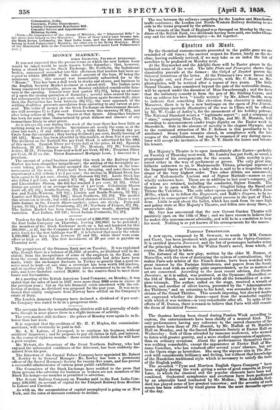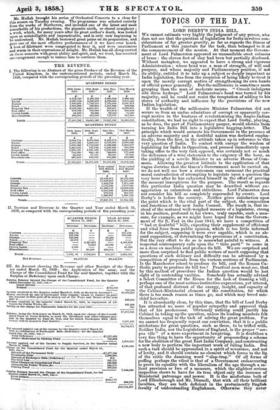bratres rah 311u5ir.
By the theatrical announcements presented to the public gaze we are reminded of old times ; the ancient respect for Easter, lately on the de- cline, having suddenly revived, if we may take as an index the list of novelties to be produced on Monday next. At the Haymarket and the Adelphi there will be Easter pieces in the technical sense of the word. The title Pluto and Prosmyine shows that classicality prevails at the former ; the Caliph of Bagdad proves the Oriental intentions of the latter. At the Princess's two new farces will be brought out, and Faust and Marguerite, with Mr. C. Kean as Me- phistopheles, will be revived after a repose of two years. The little Strand Theatre, long considered beyond the pale of the noticeable drama, will be opened under the direction of Miss Swanborough ; and the facts that the initiatory comedy is from the pen of Mr. Stirling Coyne, and that an address has been kindly written" by Mr. Albert Smith, seem to indicate that something like elevation from obscurity is intended. Moreover, there is to be a new burlesque on the opera of I'm Biarolo. An equestrian spectacle illustrative of the war in China will be offered by Mr. W. Cooke of Astley's, for the amusement of his holiday patrons. The National Standard wears a "legitimate aspect " ; and a company of "stars," comprising Miss Glyn, Mr. Phelps, and Mr. H. Marston, will according to announcement confer tragic dignity on the Easter week in Shoreditch. Sole in the absence of novelty is the elegant Olympic, and to the continued attraction of Mr. F. Robson is this peculiarity to be attributed. Drury Lane remains closed, in compliance with the late usages of the establishment, but may be reopened if any daring specu- lator will accept the invitation of Mr. E. T. Smith the lessee and become his tenant.
Her Majesty's Theatre is to open immediately after Easter—probably on Tuesday or Thursday next week. Mr. Lumley has put forth, as usual, a programme of his arrangements for the season. Little novelty is pro- mised either in the way of performers or pieces. The only great star, hitherto unknown to us, is Mademoiselle Titiens, principal soprano of the Imperial Opera at Vienna, a lady who is said to be a tragedian and singer of the very highest order. Two other debilts are announced ; that of Mademoiselle Lucioni and of Signor Mattioli—names as yet wholly unknown here. These are in addition to last year's company, all of whom are retained, including the conductor, Signor Bonetti. The theatre is to open with the Huguenots Giuglini being the Raoul and Titiens the Valentina. The only other operas specified are Verdi's Linea Miller, which is to follow the Huguenots, and MSc's Zingara to be re- produced in consequence of Giuglini's great success in the part Thad- deus. Little is said about the ballet, which has sunk from its once high and palmy state at Her Majesty's Theatre, and fallen into decay there, as everywhere else.
Mr. Gye has announced that the new Covent Garden Theatre will positively open on the 15th of May • and we have reason to believe that he makes this announcement advisedly, and will be in a condition to keep his word. Nothing is as yet known of his arrangements for the season.
PARISIAN THRATRICALS.
A new opera, composed by M. Gewaert, to words by MM. Cormon and Care, has been produced with great success at the ra-Comique. It is entitled Quentin Durward, and the list of personages includes many of the principal characters in Sir Walter Scott's novel, from which, of course, the subject is taken. The fortunes of the new play, written by the elder M. Dumas, at Marseilles, with the view of destroying the system of centralization, that makes Paris sole arbiter of the French drama, have been watched with great interest by the Parisian litterateurs, and papers from the South have been read with an avidity quite unprecedented, so far as matters of art are concerned. According to the most recent advises, Lea Gerdes Forestiers, as it is called, was produced, at the Gymnase (Marseilles) on the 23d of March, and was honoured with all the formalities of a com- plete triumph. The author, called on the stage, received a wreath of flowers, and another of silver leaves, presented by the "Administration des Theatres," and on returning to his hotel, was serenaded by the mu- sicians of the Grand Theatre. This sounds imposing, but shrewd doubts are expressed whether the drama—apart from the wonderful rapidity with which it was written—is very remarkable after all. In spite of the efforts of M. Dumas, there is reason to believe that Paris will still remain the focus of theatrical France.
The theatres having been closed during Passion Week accordingto custom, the entertainments have been chiefly of a musical kind. The only performances having any reference to the sacred character of the season have been those of The Messiah, by Mr. nullah at St. Martin's Hall on Monday, and by the Sacred Harmonic Society at Exeter Hall on Wednesday ; both of them attended by immense audience's, who seemed to listen with greater gravity, and a more studied suppression of applause, than on ordinary occasions. About the performances themselves there was nothing remarkable, except the appearance at Exeter Hall of Ma- dame Castellan, who has returned after several years' absence, but not to the Opera stage as heretofore. She sang the soprano airs in The Mes- siah with considerable brilliancy and feeling, but without that knowledge of the Handelian traditional style which is necessary to satisfy the taste of the English public. The so-called " Pyrne and Harrison English Opera Company" have been nightly during the week giving a series of good concerts at Drury Lane, in which the classical and the popular elements have been wel combined. Orchestral symphonies and overtures have been performed by an admirable band conducted by Mr. Mellon ; Miss Arabella God- dard has played some of her greatest concertos and the severity of such music has been relieved by vocal pieces from the most favourite operas of the day.
Mr. Mullah brought his series of Orchestral Concerts to a close for this season on Tuesday evening. The programme was selected entirely from the works of Beethoven, and included one of the latest and most remarkable of his productions, the gigantic ninth, or choral symphony ; a work, which, for many years after its great author's death, was looked upon as unintelligible and impracticable, and is only now beginning to be understood. Mr. Mullah bestowed great pains on its preparation, and gave one of the most effective performances of it we have ever heard. A host of dilettanti were congregated to hear it, and were unanimous and warm in their expressions of delight. Mr. Mullah has all along carried on these concerts with great ability and spirit, and, we trust, has received encouragement enough to induce him to continue them.



































 Previous page
Previous page